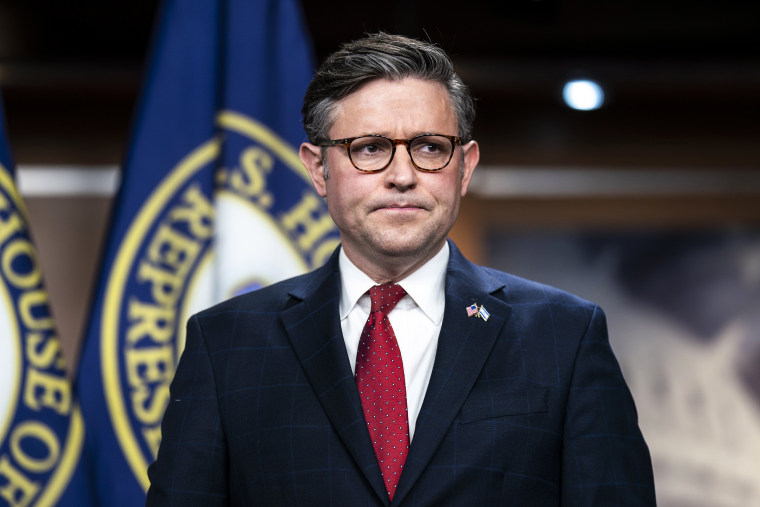WASHINGTON — House Speaker Mike Johnson, R-La., on Tuesday explained his long-held opinion that the concept of the separation of church and state is often misinterpreted.
"The separation of church and state is a misnomer," Johnson said in an interview on CNBC's "Squawk Box."
"People misunderstand it," he continued. "Of course, it comes from a phrase that was in a letter that Jefferson wrote. It’s not in the Constitution. And what he was explaining is they did not want the government to encroach upon the church — not that they didn’t want principles of faith to have influence on our public life. It’s exactly the opposite."
The question came after the host recalled that the new speaker had prayed on the House floor after he was sworn into his new role last month.
Johnson suggested Tuesday that the nation's founders believed religion and morality were central to the government.
"They knew that it would be important to maintain our system," he said. "And that’s why I think we need more of that — not an establishment of any national religion — but we need everybody’s vibrant expression of faith because it’s such an important part of who we are as a nation."
While it is technically true that the words "separation of church and state" are not written in the Constitution, many legal scholars have said that the phrase is a reference to the Establishment Clause in the First Amendment.
For his part, Johnson has spent the better part of the last two decades advocating for religious freedom in public schools, in government and in public places, mainly as an attorney for the conservative Christian group, Alliance Defense Fund, now known as Alliance Defending Freedom.
In that role, he wrote in a 2006 editorial that the ACLU and its allies had used what he called the "misleading" separation of church and state "metaphor" to intimidate public officials and to censor religious people.
"The Bible is and should be an appropriate course of study in our public schools," he wrote in another op-ed in 2007. "Because it is the most widely read, widely published, most influential book in all of history, censoring it from the classroom is as unwise as it is unnecessary."
In 2017, Johnson and Louisiana Attorney General Jeff Landry, also a Republican, created guidelines for the use of religion in school, which argued that the study of the Bible or religion in public school is "perfectly lawful," echoing an argument Johnson had made before.
At an event for students with Landry in 2018, Johnson told the audience that the separation of church and state is often taken out of context because it appeared in a letter written by Thomas Jefferson in 1802.
“They were concerned that the state was going to inhibit on their free exercise of religion,” Johnson said. "But Jefferson says, 'Don’t worry, we’ve separated the government so that the government will not meddle into your free exercise rights.’"
In 2019, Johnson expressed outrage at a House committee hearing when Democrats omitted "so help me God" from the swearing-in of witnesses. He later said it was part of a coordinated effort by Democrats to strike that phrase from language used in Congress.
“It’s important to me, personally, as a Christian, but I’m a constitutional attorney and history buff and this isn’t controversial,” he told USA Today. “Everyone who hears about this should be outraged.”

